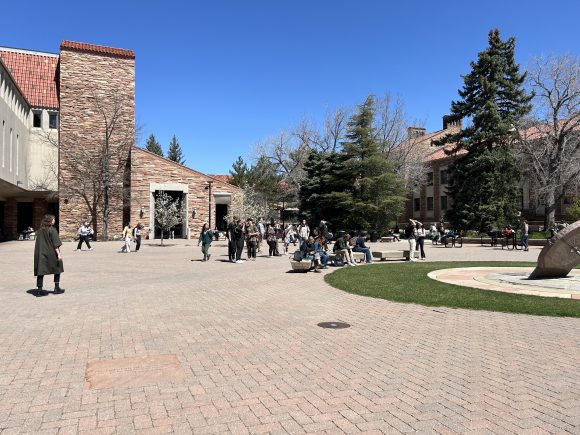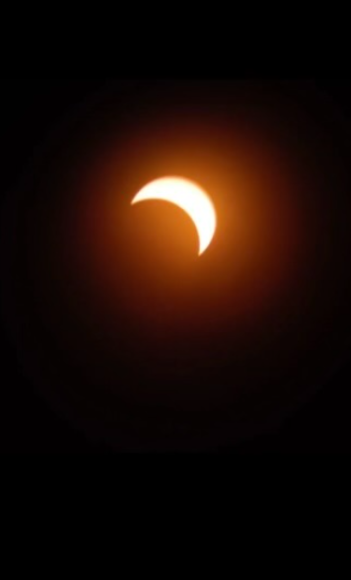
Students gather outside Norlin Library on the University of Colorado Boulder campus to view the solar eclipse on April 8, 2024. (Celia Frazier/ CU Independent)
Many students and community members at the University of Colorado Boulder stepped outside Monday, April 8 to witness a rare partial solar eclipse.
The eclipse started around 11:30 a.m. and reached its peak around 12:30 p.m. Students clad in eclipse glasses left their classes to watch from campus, taking pictures and gazing up as the moon obscured the sun. Several students expressed excitement for this rare astronomical event that won’t be visible in Colorado again until 2045 when the state will be in the path of totality.
An eclipse happens when the moon aligns with the Earth and the sun, blocking the typical view of the sun. Boulder last witnessed a solar eclipse in October 2023 when coverage of the sun peaked at 78%. On Monday, coverage peaked at 64%.

On Monday, April 8, 2024, Colorado witnessed a partial solar eclipse that peaked at 64% coverage in Boulder. (Vanessa Arambula/ CU Independent)
Garrett Lowry, a first year geophysics student at CU Boulder, was one of the students watching the eclipse.
“I’ve always had a passion for astronomy and geophysics so I’ve known about the eclipse for a while now,” Lowry said. He added that he “distinctly” remembers watching the 2017 eclipse when Colorado was in the path of totality.
Travis Richardson, a first year astronomy student, recalled his experiences with past eclipses and how they influenced his passion for astronomy.
“This is my third eclipse. I was close to the path of totality in the 2017 total solar eclipse and I recently saw the annular eclipse on October 14th last year,” Richardson said.
For him, in addition to highlighting unique scientific phenomena like eclipses, the study of astronomy yields answers to many existential questions.
“It’s such a large and unique field of study that can always bring about new discoveries, especially since they have to deal with the big questions, such as ‘how does the universe work?’” Richardson said.
Unlike Lowry and Richardson, Ollie Costello, a sophomore studying computer science, had never viewed a total eclipse and expressed his excitement to watch the event, even though Boulder did not see 100% coverage.
“I have never seen a total eclipse. I’m from Virginia so that one in 2017 wasn’t a total eclipse, so seeing this one was crazy,” Costello said. He stayed outside for the entirety of the eclipse to watch and take pictures.
Richardson also enjoyed the sense of community brought about by the mass of eclipse viewers.
“It’s a good time to hang out and watch with others,” he said.
Maria Kazachenko, a solar astrophysicist at CU Boulder, said she found that the eclipse garnered interest from a younger audience in science.
“For me, the eclipse is a unique opportunity to benefit from the public’s interest to do outreach and attract younger generations to science,” she said in a written statement to the CU Independent.
She added that eclipses also provide scientists with opportunities to advance their knowledge of solar studies and observe unique phenomena.
“Solar eclipses present a unique opportunity to do outreach, enjoy the beauty of our Universe and remind ourselves that we are part of something big that is beyond ourselves, beyond different nations and even beyond the Earth,” Kazachenko said.
Contact CU Independent staff writer Vanessa Arambula at Vanessa.Arambula@colorado.edu.
